Second Round: A Return to the Ur-Bar Read online
Page 8
Ma leapt to his feet, fists raised. “Take that back! Our auntie was a saint!”
Juanqu barked, and Jingxi shouted, “Yeah! Take it back!”
Another flash of hungry dragon eyes accompanied by a trickle of smoke from both nostrils crushed their momentary rebellion. Unfortunately, once they started talking, so did everyone else. Since the crowd was only human, Bai was tempted to give them a taste of the medicine that worked so well on Cheng, Feng, and Cheng. But he refrained and shouted for silence. Even Lao’s dry, old man’s cackle resonated nicely against the alley walls.
“You all want to press charges—and you should. At the moment, however, I’m afraid the magistrates would not treat them with the seriousness they deserve.”
In their current, custard- and mortar-daubed condition, the judges would laugh them out of court. But the humans wouldn’t appreciate it if Bai said so. He opted for a commiserating nod. “Therefore, I want you to go home”—clean yourselves up—“gather your evidence, and report to my office at the Department of Rites in the morning. My secretary will take your statements and assist you in preparing your case. Meanwhile, I will take charge of the accused. Guardsmen, restrain them.”
The three knuckleheads whimpered as the guards produced their shackles. Bai thrust his hands into his sleeves to keep from rubbing them in glee. Untangling this business would keep Lao out of Bai’s hair until well after the Harvest Moon Festival—longer, if Bai obtained what he needed from Gilgamesh.
The junior guard urged the prisoners to their feet. His senior sidled next to Bai. He whispered, “Pardon me, sir, but isn’t this a little irregular?”
He said it the same way Bai had said “illegal” not so many hours before. Bai’s cheeks split in one of Lao’s most alarming grins. “Absolutely. But look at it this way: do you really want to write up the report?”
* * *
Bai bid the two guards a gracious farewell and closed the folding doors of the bar behind them. Turning to the bar’s remaining occupants, he resumed the form of a tall, handsome, smartly-dressed young man.
Gilgamesh crossed his thickly-muscled arms over his massive chest and glowered. Bai suspected he was still annoyed at being caught cleaning. An abandoned mop leaned reproachfully against the bar. A bucket stood nearby. Sodden rags stretched across the passage leading to the kitchen. The air burned with the scent of top-shelf baijiu.
Caught between the dragon at the door and the demigod by the bar, the newly unshackled Ma, Jingxi, and Juanqu tried to make themselves very small. Bai hoped they wouldn’t faint.
Gilgamesh cocked his chin at Ma. “That guy tried to rob me today. Thanks to him, I lost three stools and two jars of my best baijiu.”
“He and his associates were also the source of the bill under your door—which I took care of at no cost to you. Now they wish to make amends by working for you. Meet your new employees: Cheng Ma, Feng Jingxi, and Cheng Juanqu.” Bai gestured to each man in turn.
Gilgamesh’s thick eyebrows drew together over his nose. “Cheng? Any relation to the former owners?”
“That’s us,” Jingxi said proudly.
Ma wrung the hem of his tunic. “I’m really sorry about the mess. I was just trying to get back our auntie’s pot.” He glanced at the embossed bronze canister now sitting in the middle of the bar. It could have been the light, but it looked newly oiled. “She begged us to keep it safe. It came with her dowry. It was never part of the bar.”
“Yeah,” Juanqu chirruped. “Those tax boys had no right to take it. That’s where Auntie Cheng kept all her recipes. We’d have never gone bust if we’d known how to read.”
A curious expression crossed Gilgamesh’s face. He murmured in Arabic, “No, they would’ve been killed. I wanted to know why Ma grabbed the pot instead of the cashbox, so I took it apart. The lower relief hides a false bottom filled with notes, markers, and IOUs. The late Madame Cheng had something on every major criminal and government official in town, including the Eunuch of the Emperor’s Wardrobe.”
“So that’s why the director was worried,” Bai remarked in the same language. In answer to Gilgamesh’s upraised eyebrow, he added, “I’ll explain later.”
“You’d better.” Reverting to the common tongue, Gilgamesh said, “I’m not interested in your aunt’s pot or her recipes. What I need is someone who knows their way around a bar.”
“You mean we’re off the hook?” Jingxi asked hopefully.
Gilgamesh thought about it, absently massaging his lower back. Bai held his breath.
“As long I like your work,” Gilgamesh said.
“You’ll love it!” Jingxi promised. He reached for the mop.
Ma grasped his cousin’s arm. “Not so fast. What’s in it for us? We got debts.”
“Big debts,” Bai confirmed in Arabic. Gilgamesh shot him the kind of fisheye Bai normally associated with Old Lao.
“But there’s something bigger at stake here,” Ma continued. “The Chengs have been in the hospitality business since the Song Dynasty. Our ancestors will haunt us something awful if we don’t have a bar to pass along to our descendants.”
A small smile threatened to part the forest of Gilgamesh’s beard. He hid it by finger combing his moustache. Yes, Bai thought. They make you want to laugh. Just think what that talent could do for business.
“You’ll get a fair salary … minus breakage, of course.” Gilgamesh gazed meaningfully at the rags. “As for owning another bar, I never stay anywhere very long. If you do a good job, there’s no reason why you can’t take over this address after I leave.”
“Do a good job!” Ma rushed to the bar and pumped the demigod’s hand. “We’ll do the best job you’ve ever seen. Jingxi, lift that mop. Tote that pail!” He pointed at Juanqu. “You, get in the kitchen or we’ll land in jail.”
Juanqu saluted. He jumped to the right, hopped over the rags, and headed down the passage.
“Is Juanqu a good cook?” Bai asked hopefully. After all, he had missed lunch—and several snacks.
“You’ve never seen anything like it,” Ma promised. “Just wait.”
With a satisfied sigh, Bai joined Gilgamesh at the bar. He leaned his elbows on the counter and confided, “They come with a floor show. Now about those favors …”
“What favors?” Gilgamesh asked. His brows lowered. His eyes narrowed in suspicion.
“You said you would be in my debt if I took care of the taxes,” Bai reminded him. “I did, without costing you a single copper cash. Then I found you three experienced employees who are about to owe a lot of people a lot of money and therefore have no objections to working for a foreigner. One plus three equals four. But before we get to that, I want that coffee you promised.”
Gilgamesh cast a martyred gaze heavenward and grumbled in Arabic, “Dragons.” He switched back to the common tongue. “Coming up.”
Perhaps Bai should ask for coffee beans and a long-handled brewing pot as one of his favors. Permission to examine Gilgamesh’s magical treasures shouldn’t cost more than one favor. Persuading the demigod to part with an artifact might take more, but he should still have enough good will left for coffee. It wasn’t as if coffee constituted a big favor.
The sound of banging pots and cupboard doors echoed from the kitchen. A moment later, a patter of feet approached the storeroom. A puff of celestial laughter, so faint he might have imagined it, intruded on Bai’s thoughts. He tried to dismiss the prickle of misgiving it provoked. Cooks often added liquor to their dishes.
But Gilgamesh, like the other barmen of the Middle Kingdom, stored his wine and hard liquor in large ceramic jars with bowl-like caps. There was no reason why Bai should hear the creak and pop of a lid being pried from a wooden barrel, or the thunk of that same lid hitting the floor. If Juanqu wanted beer, he would have tapped the bung. Slowly, almost fearfully, all senses alert, Bai straightened.
“What’s this?” Juanqu’s chirped. “Oooh, pepper! I think I’ll make Szechuan!”
A Lawyer, a Gamb
ler,
and an Outlaw Walk
Into a Bar …
A.E. Stanton
James Conason rode into town slowly, paying attention to everything. The way his horse’s hooves kicked up the dust. The slight breeze that was blowing. The smell of sage and, somehow, honeysuckle, intermingled with the smell of impending rain. It was a nice scent. Nicer than he was used to.
The town was tiny—three buildings, one large corral for cattle, which was empty. He could just make out what might be a couple of ranches in the distance. Couldn’t really call this place a town. Settlement wasn’t right, either. It was just … here. Someplace for the ranchers to come to, someplace for travelers to pass through.
No jail, though. Just a small general store, a stable, and a bar and boardinghouse, which was the biggest thing here. Gil’s Place at Four Corners. Gil must be the one who ran this town. So to speak. No jail likely meant no law. Probably also meant no stage stop. That was fine. He wasn’t looking for a stagecoach.
He looked around. No people he could see. Anywhere. Nowhere for them to live around here, either. No stage would bother with this so-called town, for certain. Meaning it was likely only here for the ranchers and their hands, and possibly for travelers like him, those coming in on horseback. Whoever worked here probably lived at Gil’s Place, too. Nice way to control your interests.
Two others were riding in, one from the east, one from the north. He was coming up from Mexico. He wondered who would be coming in from the west.
Conason dismounted and tied his horse loosely to the hitching post. He went onto the boardwalk and watched the others approaching. The one from the east was dressed like a dandy, the one from the north was all in black.
He decided not to wait. Better to see what was going on inside the bar, if anything. That way he could get into a safer position. Possibly.
Conason pushed the swinging doors open, stepped over the threshold, and surveyed the interior. It was plush—as if someone from San Francisco had moved one of their better saloons out here to the middle of nowhere. Red velvet covered the chairs and parts of the walls, all the wood dark and rich—if he had to guess he’d say it was Cherrywood—and the tables were many, some for drinking and eating, some for different forms of gambling. There was even a piano, the fanciest one he’d seen in many years.
The stairs to the second floor were at the left of the bar and they curved, just as he’d seen in truly fine houses. The rooms upstairs were numbered in gold plate or what surely looked like it. There was gilt all over the place, particularly around the large mirror that backed the bar. He’d seen a lot of frontier bars, but never one with this much opulence.
And it was huge, far larger than he’d have expected from the exterior, stocked with many bottles, far more than Conason had seen out West before. In his experience, if a bar had tequila and beer as well as whiskey it was a superior establishment. But this one had bottles that were slim and tall, round and short, and intricate works of the glass blower’s art. Every color of the rainbow was represented, too, and some of the bottles had strange things floating inside. They reflected against the mirror behind them and looked almost otherworldly.
Not that there was anyone here to impress. Barring the man behind the bar and Conason himself, the room was empty.
Until he blinked. Then, the room wasn’t empty anymore.
There were a variety of people—cowboys, gamblers, bargirls, ranchers, townspeople. There was a man at the piano, playing; card tables were filled, and drinks were flowing. The noise level was what you’d expect from a bustling establishment—only Conason hadn’t heard any noise before entering the bar, and he should have.
He looked behind him. His horse was still the only one tethered out in front. He looked back inside. Maybe there was a corral or stables he’d somehow missed.
His perusal hadn’t taken more than a second or two, but it was enough time for the bartender to notice him. He nodded. “Need a drink, stranger?” he called out. A few people looked at Conason, but not most, and the few who did went back to their pursuits without incident or interest.
Conason went to the bar. “I do. You Gil?”
“I am. What’ll you have?”
“I’d ask ‘what have you got’, but I can see that you have everything.”
Gil grinned. “You want the same old or something special?”
Conason considered. “Your best whiskey.”
“So, the same, but not the same old,” Gil said, as he turned and grabbed a bottle from behind.
“Odd spot to start an establishment as fine as this one,” Conason said as Gil poured a generous shot and put the glass down on the bar in front of him, though the bartender put the bottle back where it had been. Conason couldn’t blame him—the bottle looked expensive and the liquid in the glass had a high likelihood of being the best whiskey he’d ever had in his life.
Gil shrugged. “Anyplace is as good as another.”
Conason would have argued this, but he saw the doors swing open via the mirror’s reflection. The dandy had arrived before the man in black. He was a smaller man than Conason himself, but he looked wiry and well-muscled under his fancy clothes.
The dandy examined the room just as Conason had, but his eyes lingered on the gaming tables and a flash of disappointment crossed his face. Then he blinked and suddenly smiled, looking far more confident than he had a moment prior. So, he was a gambler. Good to know. Conason had a mistrust of gamblers—the bad ones tended to create problems and the good ones tended to be excellent con artists as a side endeavor. Based on how this man was dressed, Conason figured him for a good one.
Conason also figured that the gambler had also seen the establishment as empty when he first walked in and now saw it as full, just as Conason did. Something to ponder and possibly discuss. And perhaps worry about. Possibly.
The gambler came to the bar, nodded to Conason, and smiled at Gil. “My good sir, you seem to have a plethora of libations beyond the norm for these parts.”
Gil grinned. “I do. What can I do you for, mister?”
“I’d like a glass of your finest.”
“Finest what?” Gil asked.
The gambler shrugged. “Your finest whatever. I’m a man of many tastes.”
Gil nodded, turned, and pulled a very intricately blown bottle down from the top shelf.
“Stanton,” the gambler said, putting out his hand to Conason. “Gabriel Stanton.”
Conason took his hand slowly. “I’m—”
“Marshal James Conason.” Stanton grinned as they shook hands. “Your reputation precedes, Marshal.”
“Yours doesn’t,” Conason replied. “Though if you’re as good as your clothing and taste in alcohol insinuates, I should know who you are.”
Stanton shook his head as they let go of each other and took a drink. “Delicious,” he said to Gil. “Many thanks. As to reputations, Marshal, in my profession, the less renowned you are, the better.”
The doors swung open again and the man in black stepped through. He did a very obvious perusal of the interior, blinked, did another perusal that was far less obvious and far more intent, and Conason knew that the man in black had also seen this place as mostly empty when he’d first stepped inside.
The man seemed ready to leave—Conason wondered if this meant that he was smarter than Conason or Stanton—but then he shook himself and walked to the bar. He ignored Conason and Stanton and made a motion with his hand towards Gil. “Two fingers.”
Gil nodded and pulled a glass and bottle out from under the bar. The glass wasn’t as nice as the ones Conason and Stanton had, and the whiskey was cheap rotgut, but the man in black tossed it back, put his glass onto the bar, and Gil poured another.
Holding the glass in his hand, the man in black turned to them. “Gents.”
“Black Jack Riley,” Stanton said with a nod. “I’m honored to be in your company.”
Black Jack snorted. “Right. What about you?” he asked Conason.
Conason was about to reply when a woman appeared at the top of the stairs. She was tall, with a perfect figure a man could live and die against, and a face like an angel. She was dressed in a tight, low-cut dress, indicating that she was working the bar, and therefore might be his for a night—for a price. He wondered if she had a price that would make her his forever.
She smiled and it was as if the sun had entered the bar. He felt her smile hit him in the gut, tie itself around his insides, and pull them towards her.
He heard Black Jack and Stanton both gasp and looked at them out of the corners of his eyes. They both looked like he was sure he did—enthralled.
Gil cleared his throat, Conason blinked, and suddenly the woman just looked ordinarily attractive. The men next to him relaxed as well. Maybe it had been the lighting, or the alcohol. Or they’d all blinked when Gil had cleared his throat and were now seeing something that wasn’t real.
The woman came slowly down the stairs, nodded to the three of them, and stood at the bar. “All done?” Gil asked.
“For now,” she replied.
Gil grunted. “It’s moving day soon.”
She shrugged. “That’s as may be.” She turned to the men next to her. “I’d offer you gentlemen something to drink but I see you’re all taken care of.” She smiled at Stanton. “I’m sure you’d enjoy a game, and none of the tables have openings. Would the three of you care to play poker with me?”
Stanton took her hand and kissed the back of it as he bowed. “Gabriel Stanton, at your service. And I would consider playing cards with you to be one of the highlights of my life.”
She laughed. “I’m Missy, and you’re a charmer, aren’t you?”
Black Jack nudged Stanton aside. “Black Jack Riley, Miss Missy. And I’d find it right appealing to play anything with you that you’d like. Any kind of game, in any kind of setting.”
“Classy,” Stanton muttered under his breath.
Missy tinkled another laugh. “Oh, outlaws are always so exciting.” She turned to Conason. “Lawmen can be, too. Can’t they, Marshal?”

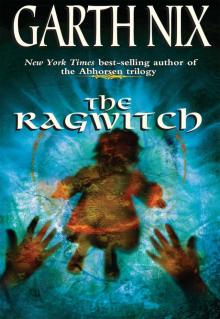 The Ragwitch
The Ragwitch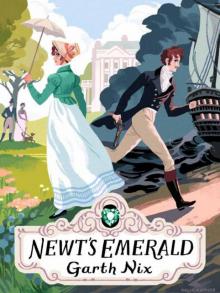 Newt's Emerald
Newt's Emerald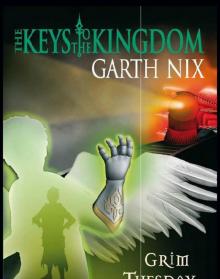 Grim Tuesday
Grim Tuesday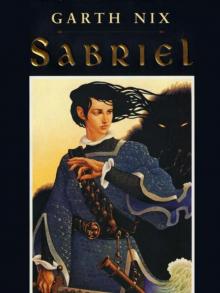 Sabriel
Sabriel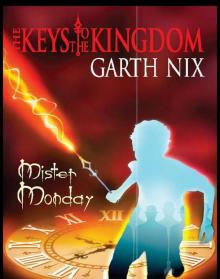 Mister Monday
Mister Monday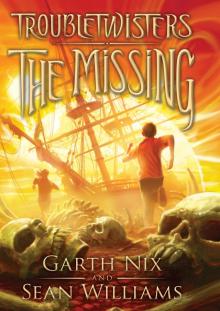 The Missing
The Missing The Fall
The Fall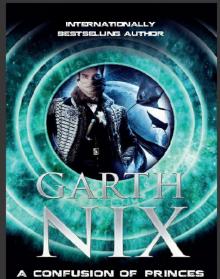 A Confusion of Princes
A Confusion of Princes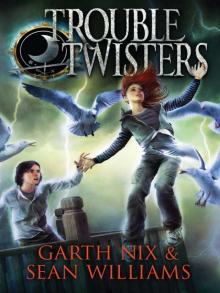 Troubletwisters
Troubletwisters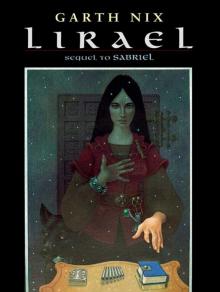 Lirael
Lirael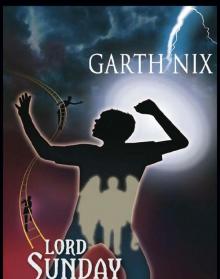 Lord Sunday
Lord Sunday Clariel
Clariel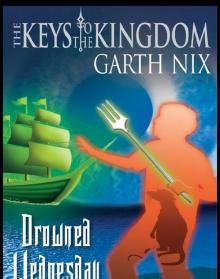 Drowned Wednesday
Drowned Wednesday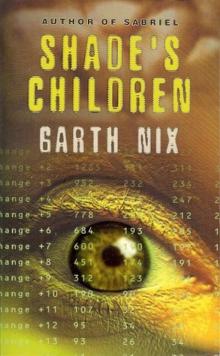 Shade's Children
Shade's Children The Violet Keystone
The Violet Keystone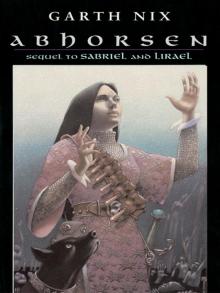 Abhorsen
Abhorsen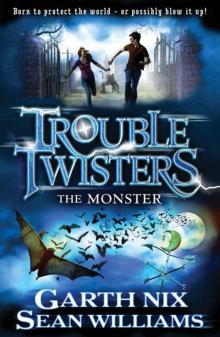 The Monster
The Monster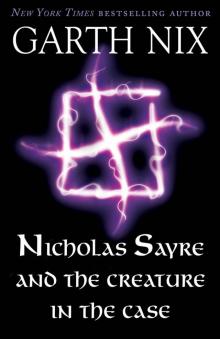 The Creature in the Case
The Creature in the Case To Hold the Bridge
To Hold the Bridge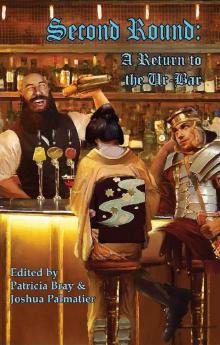 Second Round: A Return to the Ur-Bar
Second Round: A Return to the Ur-Bar Above the Veil
Above the Veil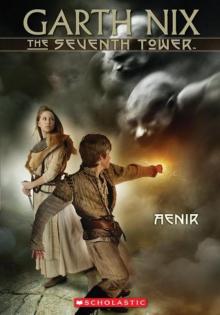 Aenir
Aenir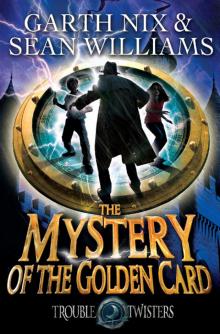 Mystery of the Golden Card
Mystery of the Golden Card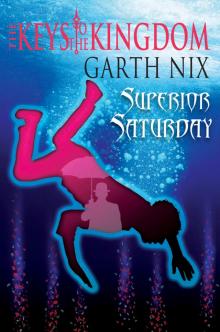 Superior Saturday
Superior Saturday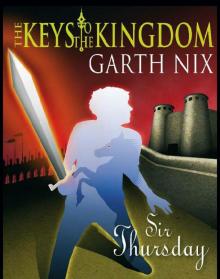 Sir Thursday
Sir Thursday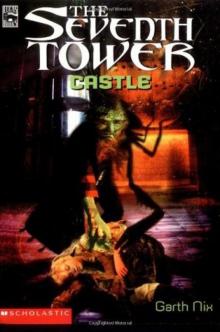 Castle
Castle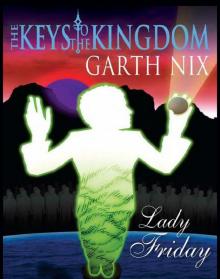 Lady Friday
Lady Friday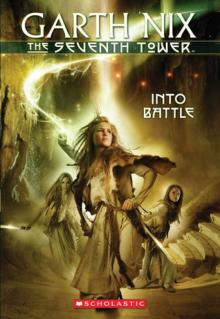 Into Battle
Into Battle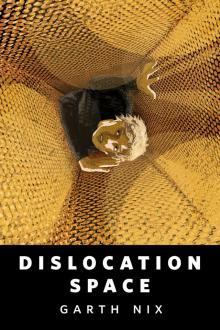 Dislocation Space
Dislocation Space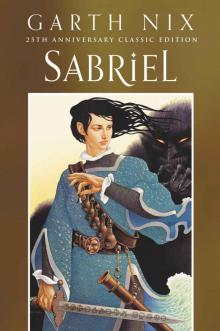 Sabriel (Old Kingdom Book 1)
Sabriel (Old Kingdom Book 1) Sir Hereward and Mister Fitz Go to War Again shamf-1
Sir Hereward and Mister Fitz Go to War Again shamf-1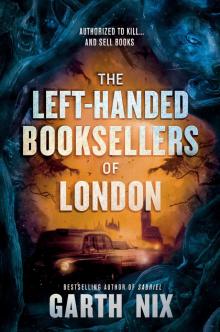 The Left-Handed Booksellers of London
The Left-Handed Booksellers of London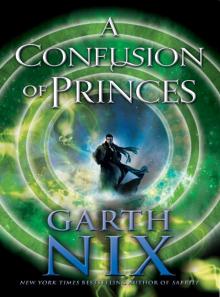 Novel - A Confusion of Princes
Novel - A Confusion of Princes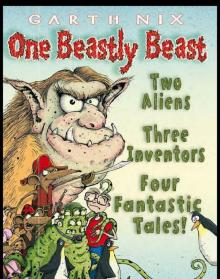 One Beastly Beast
One Beastly Beast A Suitable Present for a Sorcerous Puppet shamf-3
A Suitable Present for a Sorcerous Puppet shamf-3 Beyond the Sea Gates of the Scholar Pirates of Sarsköe shamf-2
Beyond the Sea Gates of the Scholar Pirates of Sarsköe shamf-2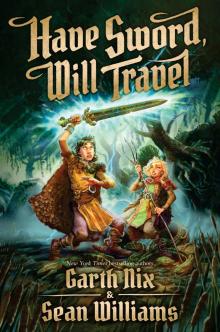 Have Sword, Will Travel
Have Sword, Will Travel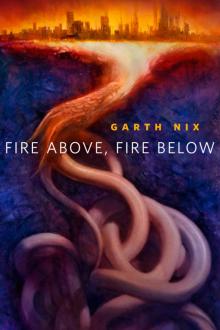 Fire Above, Fire Below
Fire Above, Fire Below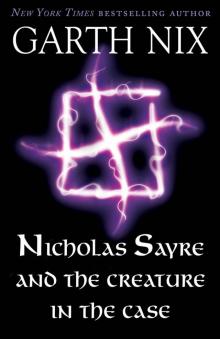 Nicholas Sayre and the Creature in the Case
Nicholas Sayre and the Creature in the Case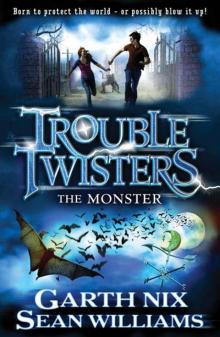 The Monster (Troubletwisters)
The Monster (Troubletwisters)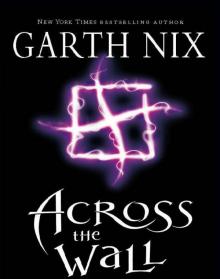 Across the Wall
Across the Wall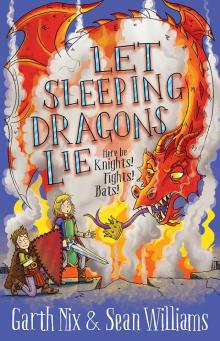 Let Sleeping Dragons Lie
Let Sleeping Dragons Lie![[Abhorsen 03a] - Across the Wall Read online](http://i1.bookreadfree.com/i2/04/12/abhorsen_03a_-_across_the_wall_preview.jpg) [Abhorsen 03a] - Across the Wall
[Abhorsen 03a] - Across the Wall